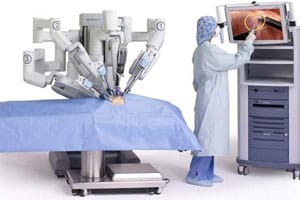
Personal injury lawsuits allege that the da Vinci robotic surgical system marketed by Intuitive Surgical has caused severe internal injuries, including burns, tears, and other complications, some of which have resulted in death or chronic pain and disability. da Vinci lawsuits fault aggressive marketing tactics used by Intuitive Surgical to convince hospitals to purchase the […]
 Personal injury lawsuits allege that the da Vinci robotic surgical system marketed by Intuitive Surgical has caused severe internal injuries, including burns, tears, and other complications, some of which have resulted in death or chronic pain and disability. da Vinci lawsuits fault aggressive marketing tactics used by Intuitive Surgical to convince hospitals to purchase the expensive surgical robot, and allege that a combination of design flaws inherent in the robot, coupled with poor physician training on the device, have resulted in serious injuries.
Personal injury lawsuits allege that the da Vinci robotic surgical system marketed by Intuitive Surgical has caused severe internal injuries, including burns, tears, and other complications, some of which have resulted in death or chronic pain and disability. da Vinci lawsuits fault aggressive marketing tactics used by Intuitive Surgical to convince hospitals to purchase the expensive surgical robot, and allege that a combination of design flaws inherent in the robot, coupled with poor physician training on the device, have resulted in serious injuries.
In fact, some 89 deaths have been linked to the robotic surgical systems since 2009. According to the U.S. Food and Drug Administration (FDA), it has received more than 200 reports of burns, cuts, and infections, since 2007, according to NBC News.
In robotic-assisted surgery, a surgeon sits at a console operating several robotic arms that manipulate small tools that are inserted into the patient’s body via tiny incisions. The system also utilizes a small, lighted camera that displays the surgical area in 3-D video. The da Vinci is the only robotic surgery approved by the U.S. Food and Drug Administration (FDA) for soft tissue surgeries, such as prostate and gallbladder removal, hysterectomies, heart repair, stomach reduction, and organ transplantation. Other, similar devices have been approved for neurosurgery and orthopedics.
As for the da Vinci, the surgical robot has been heavily marketed and used in some 400,000 surgeries in 2012 alone. Associated with a growing number of deaths and serious injuries, the high-tech systems have also been associated with a number of odd accidents. For instance, according to a prior Associated Press (AP) report, in one case, a da Vinci robotic hand gripped and would not release a patient’s bodily tissue during surgery. In another, the da Vinci’s robotic arm repeatedly hit a patient in her face as she was prone on the operating table.
Now, an NBC News report highlights one case in which a then-37-year-old woman who suffered from severely painful periods was recommended, by her physician, to undergo a hysterectomy via the da Vinci. “She mentioned that doing the robotic-assisted hysterectomy would shorten my recovery time at home,” Michelle Zarick told NBC News. One week following the surgery, Zarick began suffering from serious complications that continue to plague her
Zarick explained to NBC Rock Center’s Dr. Nancy Snyderman, chief medical editor of NBC News that five weeks after her hysterectomy, her intestines fell out of her body, through her vagina. “I felt like I had to have a bowel movement, and—as I was bearing down—I felt something kind of pop inside me,” says Zarick. “I knew that the situation that I was in at that moment was dire.” A rare situation in both robotic and traditional surgery, the sutures made at the top of the vagina following the hysterectomy opened. Cases of this happening following robotic surgery are on the rise.
“Afterwards I felt like a monster. I mean, just the way that the scars and my abdomen looked,” she said. Zarick has filed a lawsuit against Intuitive, and her case is just one of more than one dozen filed since 2011, according to NBC News.
Earlier this year, the American College of Obstetricians and Gynecologists (ACOG) issued a statement advising women that robotic surgery is not the ideal option when undergoing routine hysterectomy. And a 2010 essay published in The New England Journal of Medicine, written by a physician and health policy analyst, stated that surgeons must conduct no less than 150 procedures to become proficient on the da Vinci; however, there is no expert consensus on how much training is required.
Hospitals set credentialing, or training, requirements for doctors who will operate the da Vinci system; however, Intuitive documents reveal that its sales reps were very close to the process, presenting themselves as da Vinci experts, and working toward reduced standards so that training could be eased for busy surgeons, all to increase use of the da Vinci and its sales, according to a recent The New York Times report.
Earlier this year, we wrote that Intuitive Surgical was mandated to face claims that it marketed the da Vinci to physicians without providing appropriate training, according to a judge’s ruling, said Bloomberg News previously. That case was brought over a patient’s death following surgery in which the da Vinci surgical system was used, according to court filings. The family accused Intuitive of failing to adequately train doctors on the da Vinci system and of pushing unsupervised surgeries too quickly, among other issues.


